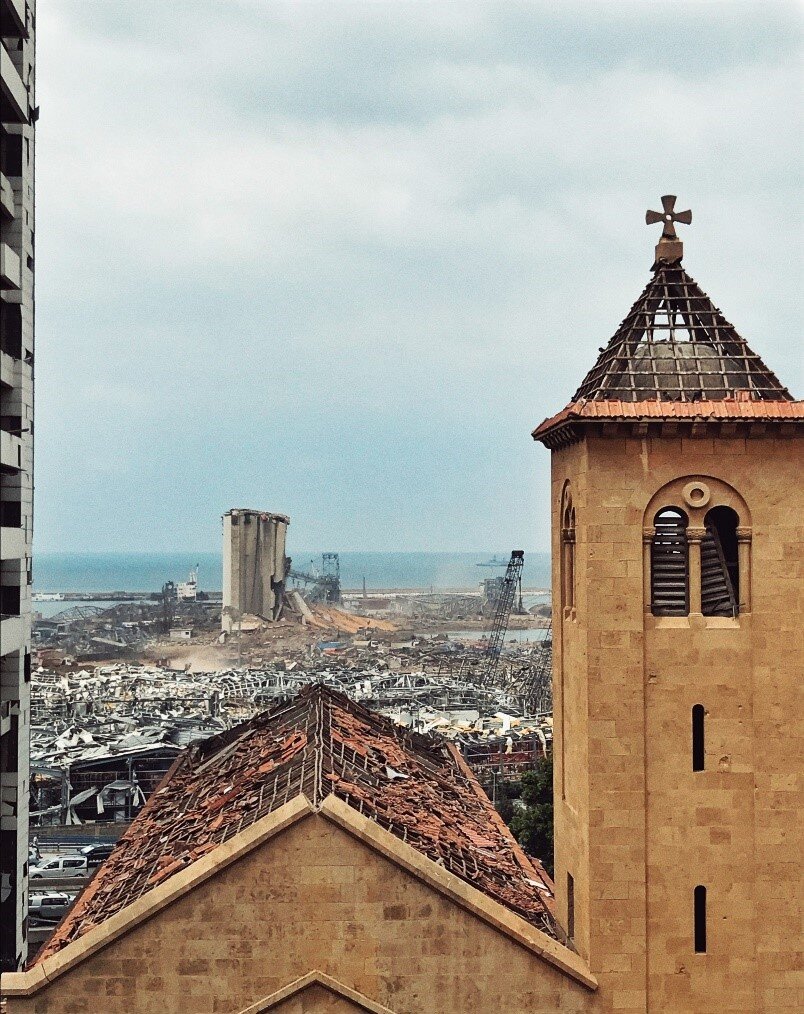“O God, who will roll away the stone from the hearts of wounded Beirut and its affected citizens”
On August 4, at around 6:00pm, a warehouse at the Beirut Port containing large quantities of ammonium nitrate exploded. After an initial explosion, a subsequent blast caused widespread damage, with reports of damage more than 20 km from the port area. Hundreds of buildings including grain silos storing around 85 percent of the country’s grain, and numerous residential places have also been damaged or completely destroyed. Three Christian hospitals in the Beirut Area, which welcome both Christian and Muslim patients, were severely damaged. Additionally, many historical church related schools in Gemmayzeh, Mar Mikhael and Achrafieh were badly affected just before the coming academic year in September. The Christian quarter of Beirut is totally devastated and at least ten churches have been destroyed. Moreover, official governmental reports estimate that more than 137 people were killed, around a 100 are still missing, over are 5,000 injured, and more than 300,000 people were left homeless in the Greater Beirut area.
As Lebanon is already struggling from the financial crisis, the high rate of unemployment, the hyperinflation and the Lebanese Pound devaluation, while hosting large number of refugees, this explosion came to deepen the crisis and put extra pressure on the Lebanese population, the Lebanese government and the refugee communities. Adding to that the COVID-19 transmission which is straining the country’s health system.
Lebanon has been through a lot: wars, crises and catastrophes. But what happened on August 4 in the port of Beirut went beyond anything the Lebanese could have imagined. The explosion reduced large parts of the capital to rubble and made all Lebanese people lose their hopes for a better life. Till now, Lebanon is still living under the impact of trauma.
During many crises faced by Lebanon in the past, churches have borne responsibilities in easing the burden on all people by standing side by side with the most vulnerable through a variety of diaconal services. But today, they are unable to provide their diaconal services due to the destruction of their educational and health facilities. Churches need hundreds of millions of dollars to rehabilitate their prominent institutions that used to serve all strata of Lebanese community alike. Noting that the level of damages in Beirut is beyond the capacity of the Lebanese governments, existing INGOs and LNGOs as to date, it is estimated at around 5 Billion US$.
For now, Churches’ volunteers from all denominations and civil society groups have stepped in to fill the gaps left by the government and began removing the rubble and debris from streets, churches and hospitals in order to show that life can continue in the midst of tragedies, armed with their faith in the resurrected God that is always in our midst. Monasteries and schools were opened to host people who have been left without a roof and daily food is served to people in need.
Since its inception, MECC has always considered that standing with vulnerable people is not just a social duty but a Christian responsibility based on our Lord’s commandments. In fact, one of its main strategic objectives is to uphold human dignity in times of conflicts and during all kinds of disasters. Therefore, for quick response, MECC will support vulnerable families by distributing hygiene kits, dignity kits, kitchen sets, bedding sets, food kits, medicines, COVID-19 safety accessories (face masks, gloves, face shields, sanitization) and tools (shovels, brooms, bags, carts for moving rubbles) to volunteers who will help in cleaning the churches, hospitals and the streets. Additionally, MECC’s support will include the provision of medicines to many chronic disease people and cancer patients who are living in shelters or with their relatives after having lost their homes. MECC will use the existing mechanism in the churches and other active local NGOs. The distribution will be either through MECC team or through church related organizations and LNGOs for quick distributions. At a later stage, and after completing the joint assessments with other actors on the ground, MECC will be involved in the rehabilitation of damaged homes, schools and dispensaries.
Lebanon is expecting a strong stand from the international community and international organizations to lend a helping hand in such difficult times. It is time to show solidarity and love irrespective of any differences that can hinder a quick and timely aid. Thus, we call upon all our partners and friends, to answer our call and aid us in easing the huge burden on churches and in rolling away the stone of suffering, terror and despair from the hearts of vulnerable citizens and families affected by this unprecedented catastrophe.
Source: mecc.org






